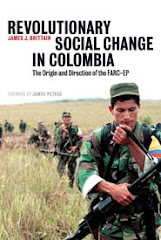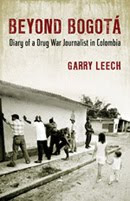The Following letter was sent from ARSN to Canada's Minister of Foreign Affairs John Baird on Decmber 23rd, 2014:
Hon. John Baird
Minister of Foreign Affairs
House of Commons
Ottawa, ON
K1A 0A6
December 23, 2014
Dear Minister Baird,
We write today on behalf of the Atlantic Regional Solidarity Network to express our concern over the human rights crisis in Mexico, and to ask the Canadian government to take immediate action. The Atlantic Regional Solidarity Network brings together individuals and organizations from across Atlantic Canada who share a commitment to solidarity with Latin America and the Caribbean. We have been watching with concern the events unfolding in Mexico in recent months, particularly in response to the violence on September 26th directed against a group of students from the Ayotzinapa Normal School, a rural teachers college in Guerrero State. This violence left six young people dead, and 43 forcibly disappeared. Recently found human remains have been analysed by forensic anthropologists and it has been confirmed that they belong to one of the 43 missing students.
This tragic event has exposed the deteriorating human rights situation in Mexico, ongoing corruption, and the collusion of state actors with organized crime. It has also mobilized people from across Mexican society who have taken to the streets to demand the return of the remaining 42 missing students and to call for the resignation of high-level Mexican officials. The Governor of Guerrero has already been forced to step down and protests are calling for the resignation of President Enrique Peña Nieto. Protesters have been charged with serious crimes such as conspiracy and involvement in organized crime and are being detained in high security prisons. There are also serious concerns about the safety of human rights defenders who have been accompanying the families of the 43 disappeared students.
These events are taking place in the context of the 20th anniversary of the signing of the North American Free Trade Agreement (NAFTA). Like many other free trade agreements, NAFTA was promoted based on the notion that through developing business and trade relationships the human rights situation could be improved. After 20 years of free trade engagement with Mexico, we can now take stock of how this approach to the promotion of human rights abroad has worked.
As the families and communities of the 43 disappeared students continue to search for their loved ones, every day more mass graves with unidentified bodies are uncovered. Since 2006, at least 150,000 Mexicans have been murdered. Guerrero has long been one of the most violent states in the country. In 2012, its homicide rate was just short of Honduras’, considered the most violent country in the world. Mexico has also seen a dramatic rise in the number of forced disappearances. Fifty four people go missing in Mexico every week, totalling 22,610 disappearances since 2007. 2014 has been the worst year on record, with 5,098 disappearances.i
The tendency of the Mexican government is to focus the blame for this violence on the drug cartels, who wield significant power in Mexico. However, focusing on the cartels exclusively ignores the reality of collusion of state forces including police, military and elected and appointed state officials with organized crime. In Iguala, the students from the Ayotzinapa Normal School were shot at and later seized by police, allegedly at the behest of the mayor of Iguala and his wife. Evidence indicates that the police handed them over to criminal gangs to be tortured and killed. A recently released report by Amnesty International found that “torture and other cruel, inhuman or degrading treatment or punishment play a central role in policing and public security operations by military and police forces across Mexico. These practices are widespread and are frequently condoned and tolerated by other law enforcement officials, superior officers, prosecutors, judges and some human rights commissions.”ii Recent reports in a national newspaper cite leaked documents that reveal that state officials knew about the attack on the Ayotzinapa students as it was happening and did nothing to stop it. The case of the 43 disappeared students has exposed the deep-seated corruption of the Mexican State, and the collusion of state forces in terrorizing the Mexican civilian population.
This current reality of the ongoing human rights “crisis” in Mexico reveals the failure of the ‘free trade’ approach to human rights promotion. Since 1994, when NAFTA was signed into effect, the human rights situation in Mexico has drastically deteriorated. Meanwhile, Canadian foreign investment in the region has significantly increased. Mexico is now the foremost destination abroad for Canadian mining interests, and according to the Canadian Press, exports of Canadian weapons and ammunition to Mexico climbed by 93 per cent between 2011 and 2012. Meanwhile, as you know, the Canadian government is sending millions of dollars to fund the Mexican military and police forces through the Anti-Crime Capacity Building Program (ACCBP).
We ask that the Canadian government take immediate action by:
- Making a public statement calling on the Mexican government to respect the peaceful protesters’ rights to freedom of assembly, association, and speech, and right to protest;
- Calling for a guarantee of the safety of human rights defenders, including Vidulfo Rosales and Abel Barrera from the Tlachinollan Human Rights Centre , who have been criminalized for their work in defense of human rights in the state of Guerrero and for accompanying the families of the 43 disappeared students;
- Calling for a complete and impartial third-party investigation into the events of September 26th and 27th in Iguala, and the immediate destitution of any and all political officials found to be implicated;
- Suspending any further funding for “security” initiatives in Mexico until a complete review of corruption and collusion with organized crime within the Mexican military and police forces has been completed and the issues identified are addressed;
- Revising its current hemispheric trade agreements and pursuing a different trade agenda based first on respect for human, labour and environmental rights.
The people of Mexico have shown themselves to be strong, resilient, and courageous in standing up against violence and corruption, and we owe them our support.
Atlantic Regional Solidarity Network
CC:
Marc Garneau, MP
Irwin Cotler, MP
Paul Dewar, MP
Wayne Marston, MP
Elizabeth May, MP
-----------------------------------------------------------------------------------------------------------------------------------------------------------------
i The statistics provided here are based on official figures and the real numbers can be assumed to be much higher given that the vast majority of crimes are not reported. These numbers are based on the reports from INEGI (the National Statistics and Geographic Institute) and SNSP (the National Public Security System (for 2014 only). Source documents: 1) Proceso, “Los Muertos Que Hablan,” in edition No 1922, September 1, 2013 and also Proceso, “Mas de 121 mil muertos, el saldo de la narcoguerra de Calderón: INEGI,” Jul 30, 2013; 2) INEGI, “En 2013 se registraron 22 mil 732 homicidios” 23 julio 2014; 3) Proceso, “Se reportaron cuatro muertes por hora en enero a mayo: SNSP,” Jun 26, 2014 http://www.proceso.com.mx/?p=375776
4) http://www.telegraph.co.uk/news/worldnews/centralamericaandthecaribbean/mexico/11275460/Revealed-the-full-scale-of-Mexicos-disappearances.html
ii http://www.amnesty.org/en/library/asset/AMR41/020/2014/en/468aee5a-ecc3-470f-9387-a8a10b5670cc/amr410202014en.pdf





